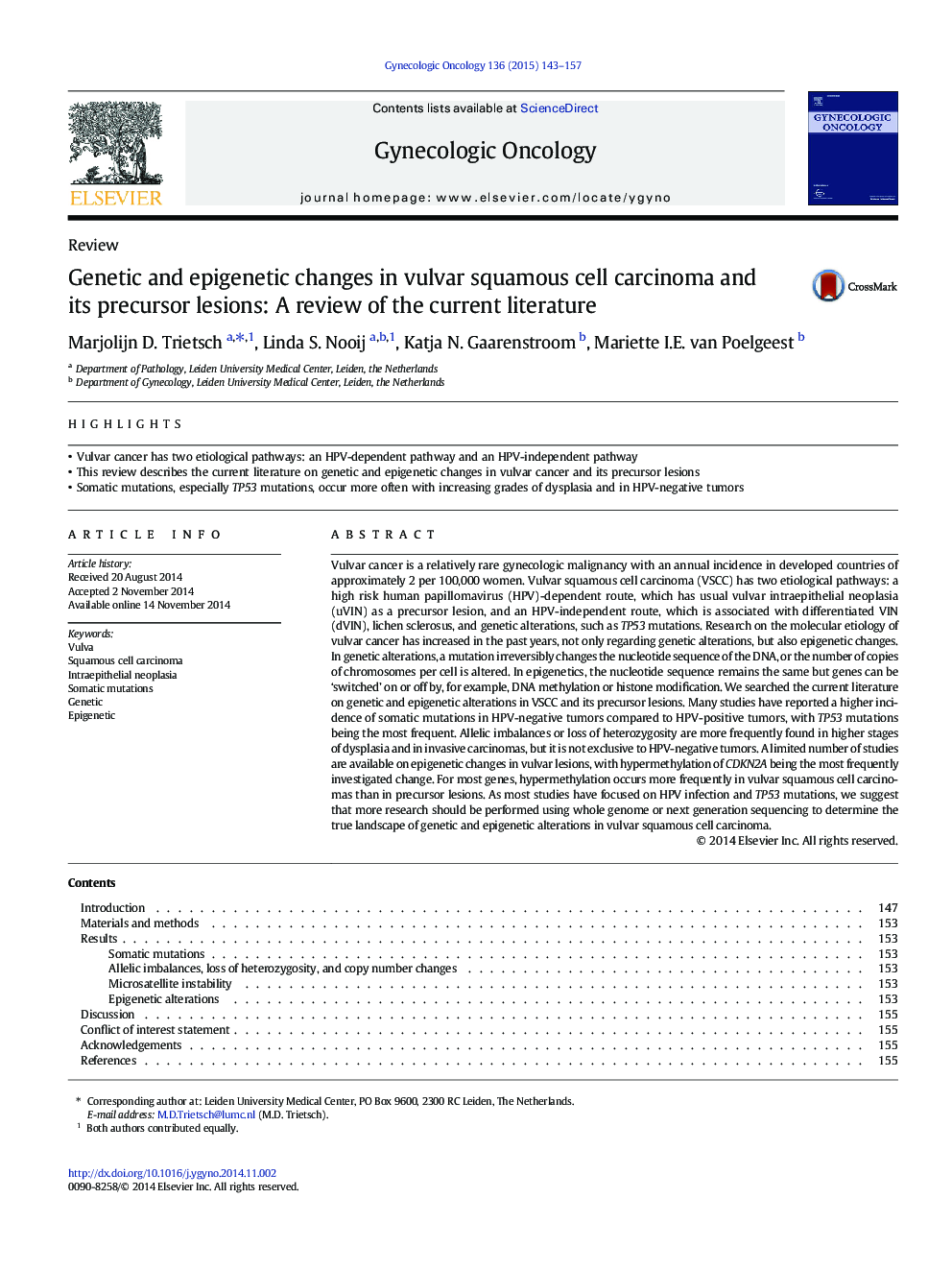| کد مقاله | کد نشریه | سال انتشار | مقاله انگلیسی | نسخه تمام متن |
|---|---|---|---|---|
| 6183256 | 1254095 | 2015 | 15 صفحه PDF | دانلود رایگان |
عنوان انگلیسی مقاله ISI
Genetic and epigenetic changes in vulvar squamous cell carcinoma and its precursor lesions: A review of the current literature
ترجمه فارسی عنوان
تغییرات ژنتیکی و اپی ژنتیکی در کارسینوم سلول سنگفرشی ولوو و ضایعات آن پیش آگهی: بررسی ادبیات جاری
دانلود مقاله + سفارش ترجمه
دانلود مقاله ISI انگلیسی
رایگان برای ایرانیان
کلمات کلیدی
وولوا، سرطان سلولی فلسی، نئوپلاسی داخل صفاقی، جهش های اجتماعی ژنتیک، اپی ژنتیک،
موضوعات مرتبط
علوم پزشکی و سلامت
پزشکی و دندانپزشکی
زنان، زایمان و بهداشت زنان
چکیده انگلیسی
Vulvar cancer is a relatively rare gynecologic malignancy with an annual incidence in developed countries of approximately 2 per 100,000 women. Vulvar squamous cell carcinoma (VSCC) has two etiological pathways: a high risk human papillomavirus (HPV)-dependent route, which has usual vulvar intraepithelial neoplasia (uVIN) as a precursor lesion, and an HPV-independent route, which is associated with differentiated VIN (dVIN), lichen sclerosus, and genetic alterations, such as TP53 mutations. Research on the molecular etiology of vulvar cancer has increased in the past years, not only regarding genetic alterations, but also epigenetic changes. In genetic alterations, a mutation irreversibly changes the nucleotide sequence of the DNA, or the number of copies of chromosomes per cell is altered. In epigenetics, the nucleotide sequence remains the same but genes can be 'switched' on or off by, for example, DNA methylation or histone modification. We searched the current literature on genetic and epigenetic alterations in VSCC and its precursor lesions. Many studies have reported a higher incidence of somatic mutations in HPV-negative tumors compared to HPV-positive tumors, with TP53 mutations being the most frequent. Allelic imbalances or loss of heterozygosity are more frequently found in higher stages of dysplasia and in invasive carcinomas, but it is not exclusive to HPV-negative tumors. A limited number of studies are available on epigenetic changes in vulvar lesions, with hypermethylation of CDKN2A being the most frequently investigated change. For most genes, hypermethylation occurs more frequently in vulvar squamous cell carcinomas than in precursor lesions. As most studies have focused on HPV infection and TP53 mutations, we suggest that more research should be performed using whole genome or next generation sequencing to determine the true landscape of genetic and epigenetic alterations in vulvar squamous cell carcinoma.
ناشر
Database: Elsevier - ScienceDirect (ساینس دایرکت)
Journal: Gynecologic Oncology - Volume 136, Issue 1, January 2015, Pages 143-157
Journal: Gynecologic Oncology - Volume 136, Issue 1, January 2015, Pages 143-157
نویسندگان
Marjolijn D. Trietsch, Linda S. Nooij, Katja N. Gaarenstroom, Mariette I.E. van Poelgeest,
